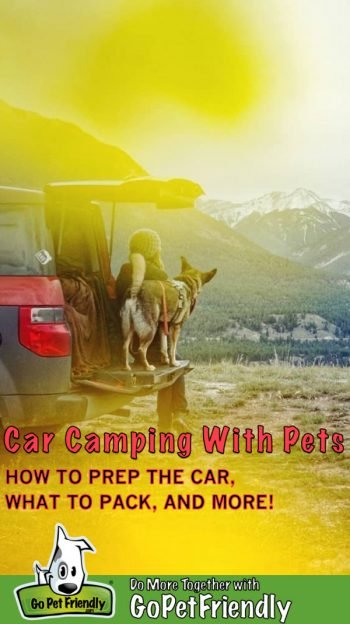Car camping with pets is a great mash up between tent camping and van life. It gives you mobility and protection from the elements without the up front costs of fitting out a van. With some simple modifications, your car will be ready for pet friendly adventures in no time!
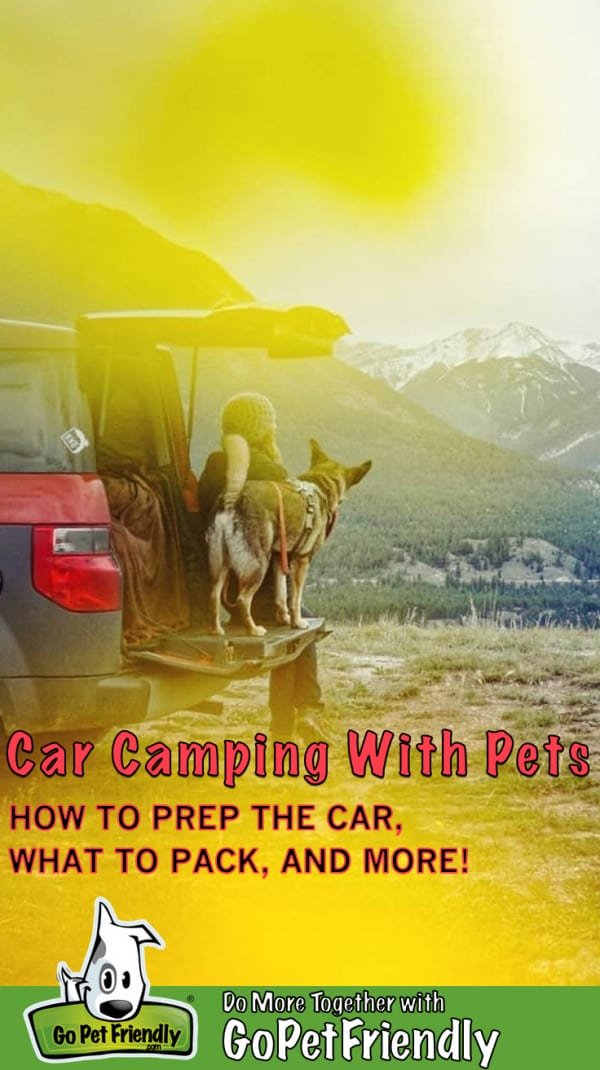
Car camping isn’t quite as rustic as tent camping — and is less expensive than building out a van. And there are simple ‘car life’ builds for nearly every type of vehicle. With a little work and preparation you can set up your vehicle for car camping adventures with your pets. Read on for ideas on building, setup up your space, and packing for your first trip!
Are you ready to set up your existing vehicle for car camping with pets? It can be cute, and oh-so-cozy. And then you can park up close to those wonderful views!

Creating A Sleeping Area
Your first consideration will likely be about how to get a good night’s sleep. There are an array of options and builds on just about any style of vehicle. Let’s get started with some simple ideas of how to create a comfy bed for you and your pets.
A basic plywood platform bed is the answer for most car campers. This includes hatchbacks, wagons, canopy trucks and even four-door cars. There are also air mattresses designed to specifically streamline over seats for a pleasant night’s rest. And they might not require any building at all!
While a platform doesn’t have to be complex to get you out the door for camping, it is beneficial to spend some time thinking about your comfort and storage. With a good plan, you could have it built in one sunny weekend day!
READ MORE ⇒ Camping with Dogs – A Beginner’s Guide
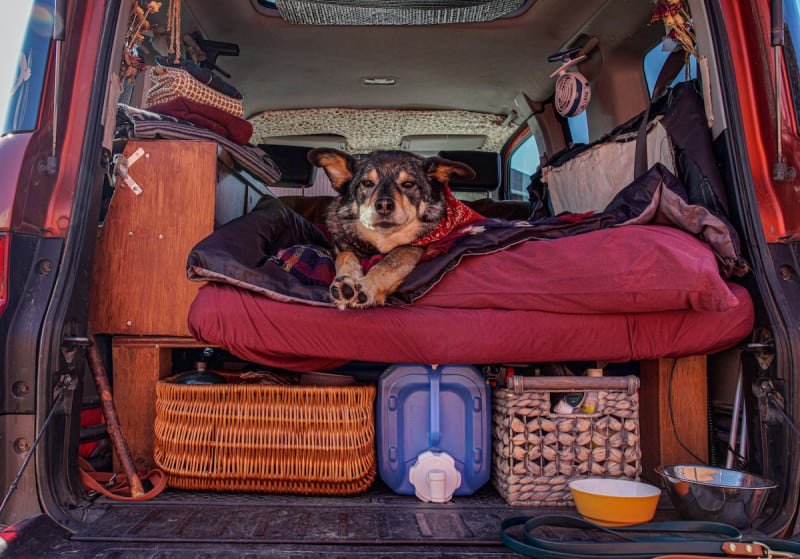
To start; you will either fold down or remove the seats in your vehicle, depending on how it’s built. For example, I have a Honda Element and the back seats are designed to come. But, in my first car camping build — a Ford Focus wagon — the seats folded down.
Once you have your seats down or out, measure the available space for your platform. Include a measurement for the height of your bed that balances comfortable sleeping space with storage below.
The plywood you purchase should be 3/4 inches thick. And you’ll need five thick, square posts — one for underneath each corner of the platform and one for stabilizing the center. Voila! You have the base to a comfortable bedroom area!
Bonus Space: A Pet Bed
For even more bedroom space for you and your pets, another plywood cutout can transform the front seats into a pet bed!
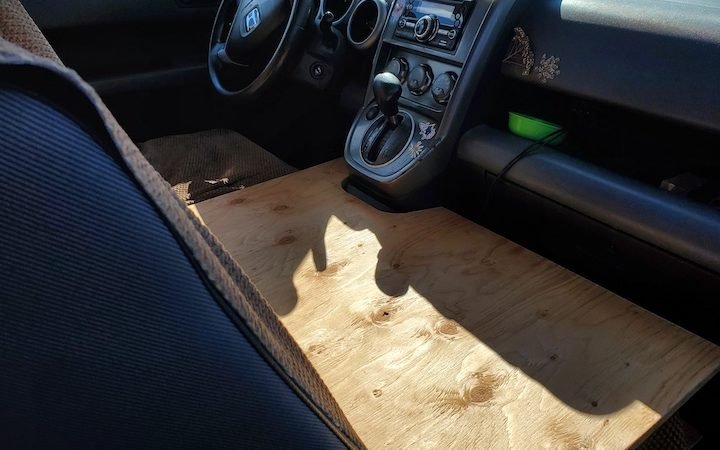
For maximum car camping comfort, choose at least a 3-inch memory foam mattress for all of the bed platforms. Then top it with your desired bedding and pillows. The beauty of car camping is that you can bring whatever you want!
Food And Water Considerations
After completing your cozy sleeping space, it’s time to think about what you’re going to eat and drink. It is very reassuring to always keep more of these items on hand than you think you will need. You never know when you’ll find a magical camping spot and want to stay an extra night!
Some great non-perishable food items include: dried fruits, cereal/oatmeal, nuts, dried coconut, chocolate, canned soup or chili, and rice noodles.
READ MORE ⇒ The Ultimate Pet Friendly American Road Trip

Pet Food Tip
I have learned that, on long trips, you cannot expect to find your desired pet food in all locations. And abruptly changing your pet’s food can result in gastrointestinal upset, which could make your car camping experience less pleasant for everyone.
To keep your pets happy, do your research before you leave to determine where their food can be purchased. You can do this by calling pet stores where you’ll be traveling to ask if they carry your pet’s food. If you’re having trouble locating it, consider shipping food ahead to stops on your trip where they will hold the package for you.
Also keep in mind that pets often need more food during road trips when they’re doing more hiking or swimming are increased.
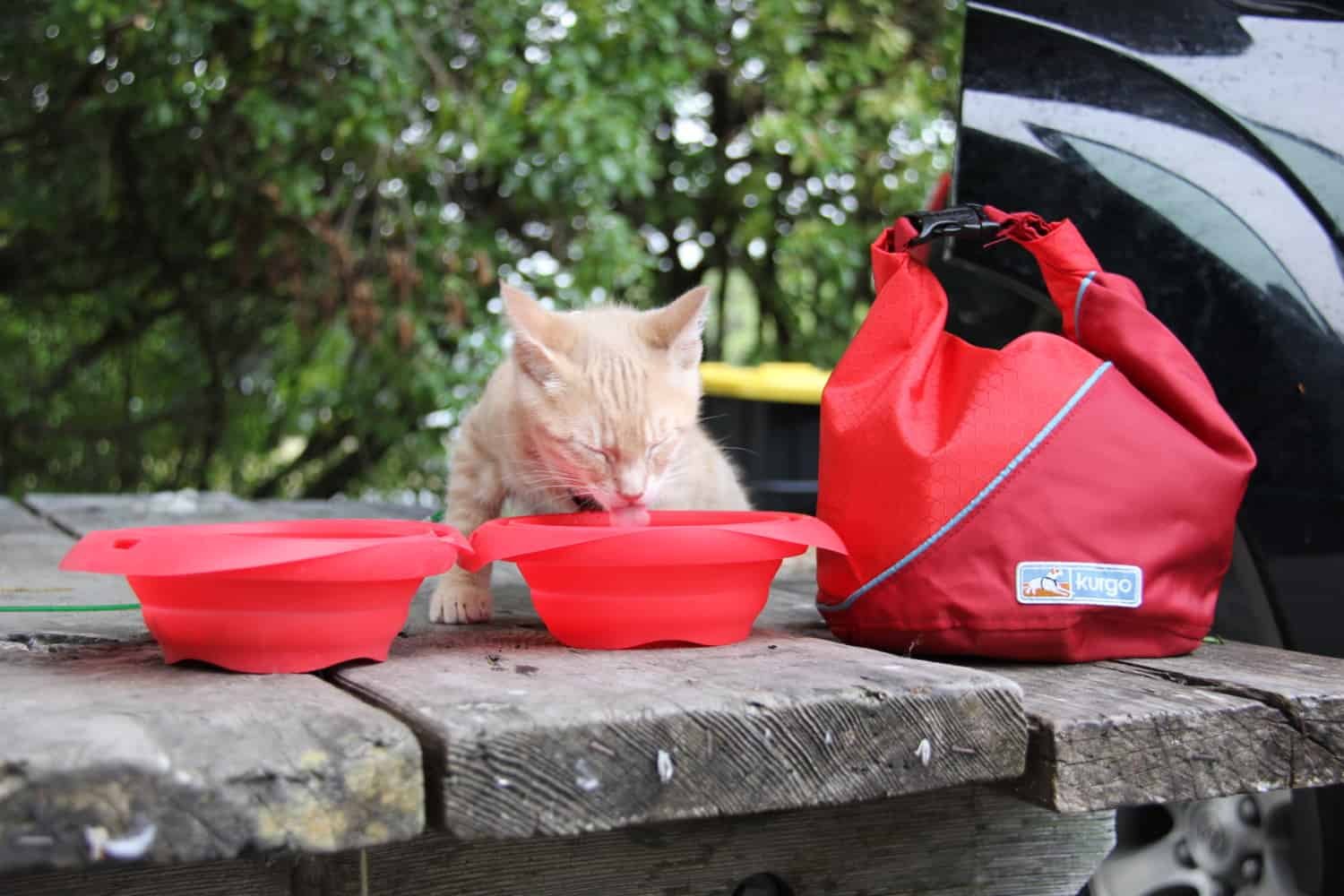
A Bit About Water
After you have nice selection of food stashed, pickup refillable water containers. When deciding how much drinking water you’ll need, plan at least 3-4 liters a day for humans and 1+ liters for a 40-pound dog. If you are doing extensive hiking or will be traveling in hot weather, take extra water. And remember this does not include water for cooking or cleaning up!
While you are traveling take every opportunity to refill your containers. Places to find available drinking water are: day use areas of campgrounds and parks, gas stations, and sports fields.
Another consideration is that it can be difficult to leave a water bowl next to your pet while you’re driving. So during any stops you make, make sure to offer your pet water.
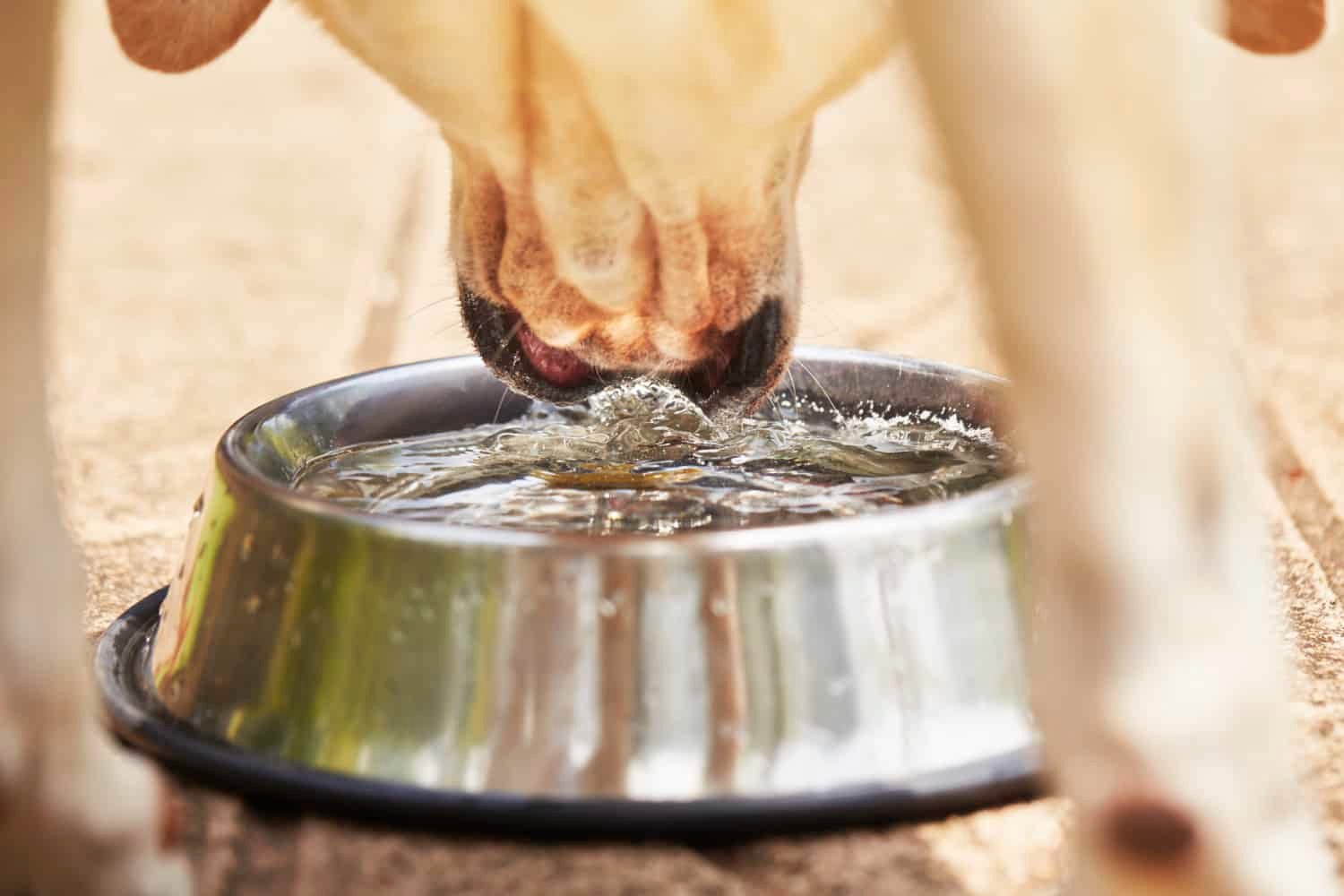
Getting More Comfortable
With enough blankets, food, and water packed for you and your pets, let’s move on to some additional comforts. These ideas can provide you with an even more enjoyable car camping with pets experience!
Sleeping in a car can be either too cold or too warm. Let this be your reminder that you can never pack too many blankets. Desert and mountain areas can get shockingly chilly, despite the warm temperatures during the day.
If you’re camping somewhere that stays warm at night, chances are you’ll want to crack your windows. If you are in a buggy area this can be quite the situation without preparation. Thankfully, there are quick universal screen coverings to solve this problem. Just slip them on your windows and snooze away! They also offer the added bonus of blocking out some heat during the day.
READ MORE ⇒ Tips and Tricks for Road Tripping with Cats
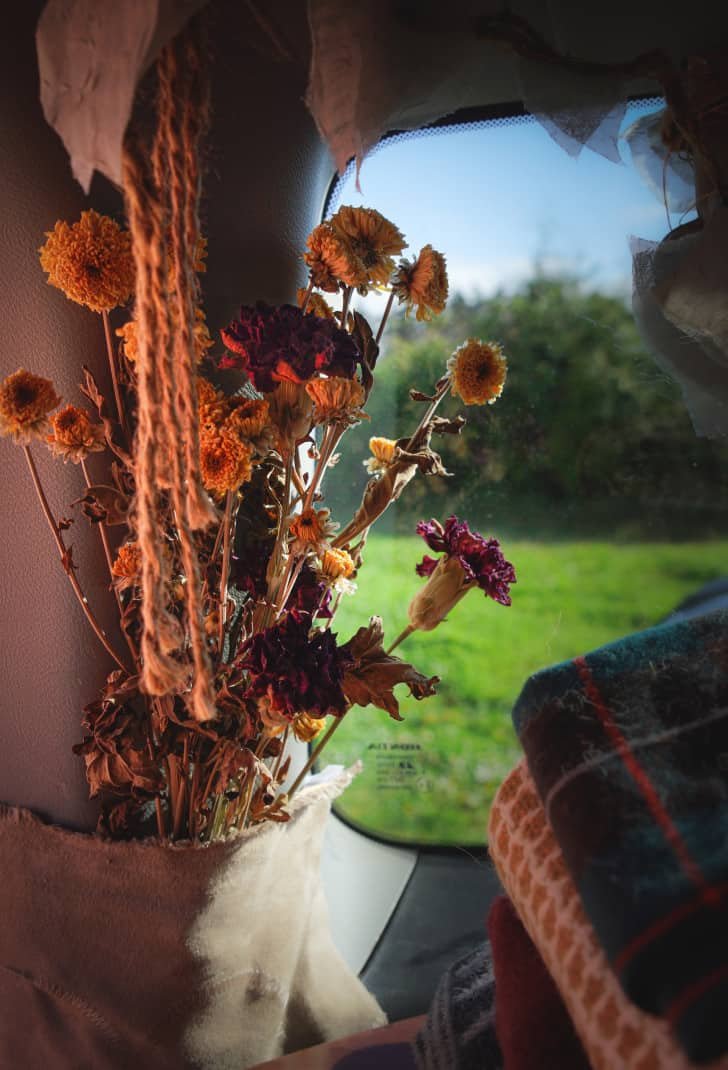
Keeping Your Cool
Another lovely addition to having your windows cracked are mini battery powered fans. These are particularly nice when traveling in humid heat. I even set my dog, Riley, up with a personal fan while I’m driving. These have been a great addition to our car camping gear!
A mini fan will typically run for eight hours before requiring a recharge. You can purchase USB battery chargers to recharge the batteries the next time you drive or with a portable charging bank.
Charging Your Devices
If you are camping for a few days in one spot, keeping your phone and other devices charged might be a concern for you. This can be remedied in a couple of ways. The first is using battery bricks. These are perfect for charging phones, cameras, and other small devices. If you need to charge a laptop or run appliances like a blender, you will need a power station.
The combination of battery bricks and a power station might provide enough juice for you. But, if you’d like and off-grid way to recharge them too, you’ll want to consider a solar panel. Solar panels can also be connected directly to your phone or laptop. I recently added a mini solar panel to my charging solutions and have been blown away by it!
One More Way to Charge Up
Don’t forget that you can utilize the 12V port in our car with a USB adapter to charge devices anytime you’re driving!
READ MORE ⇒ What If Your Dog Got Lost In A Cell Phone Dead Zone?
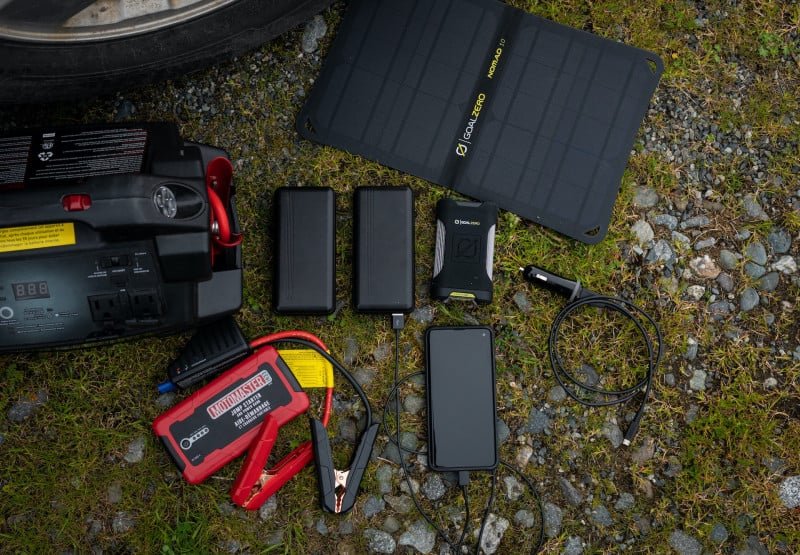
A Simple Stylish Lighting Upgrade
You’ll definitely want to pack your flashlight or headlamp … but when you’re inside at night, those lights just don’t cut it. Your space will be so much homier with simple string lights!
Purchase lights powered by batteries, and use the handles and other anchor points to hang them around your vehicle.
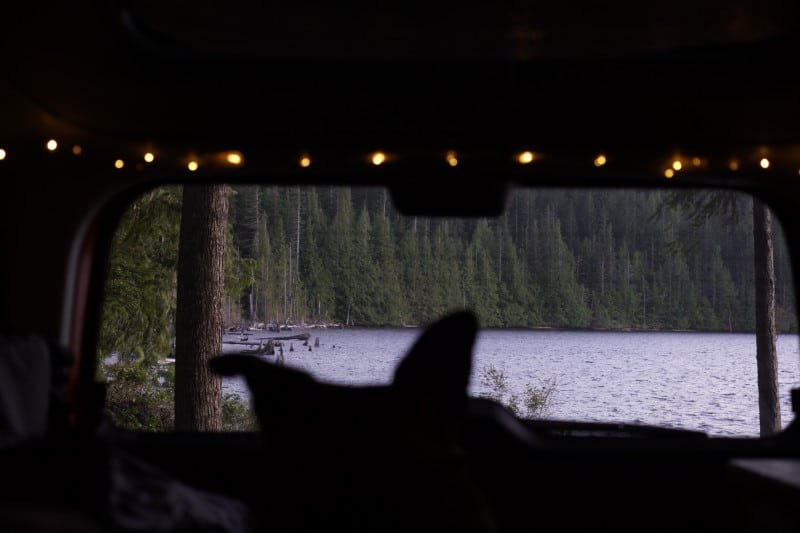
Still Enjoy Movie Night
Before you head out remember to get a movie or two ready for off-line viewing. It’s especially comforting to watch one of your favorite flicks when you are solo camping for the first time! If you don’t have a music or movie subscription service you can download free Google podcasts to listen to while you’re offline.
Car Camping Privacy/Noise
The best bet for managing possible noise disturbances while car camping is to pack your ear plugs.
A quick DIY privacy solution for getting dressed is to make Reflectix or cardboard cutouts for the necessary windows. (Reflectix also doubles as a cooling solution to help reflect the heat when it’s hot outside.)
A second option is to string up some curtains with a stylish fabric you love.
And a third option is to make window inserts that are stealth from the outside and decorative on the inside. They have the benefit of blocking cold window drafts at night for a warmer sleep, too!
To make stealth window inserts you would:
- Get black fabric to face out.
- Pickup a 1cm thick blanket from a thrift sore.
- Get Reflectix from a building store.
- Pick a decorative fabric for the inside.
Cut one piece of Reflectix and two pieces of blanket for every window. Start with the Reflectix, making it slightly bigger than the window and then trim as you go. When the Reflectix fits nicely in the window and stays put, then you are ready to cut all of the other pieces around it. Sandwich the Reflectix between the two blanket cutouts. Then sew your black and decorative fabrics to the in and outsides.
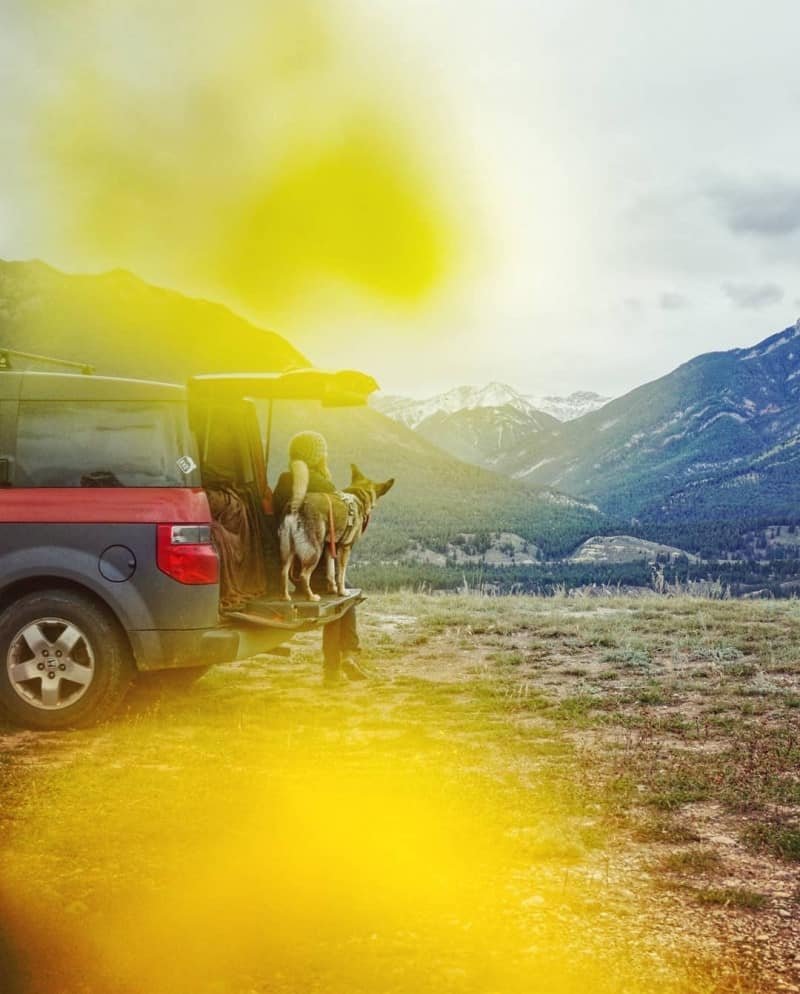
Additional Privacy Or Warmth
If your bed is set up behind the front seats you can create a simple barrier that adds both privacy and some warmth. Take measurements for the dimensions of your vehicle interior and then pickup some black fabric that is slightly larger than those specifications, at least 2 inches. Secure the fabric to the plastic header just behind the front seats with Velcro tape.
Using black material is more sleek in this application. It also aids in blackout for sleeping if you have created the other window privacy inserts. On cold nights, it will block some coolness from the cab of the vehicle as well. It could be too hot to use in warm climates, and this isn’t a must have. But it’s possibly a nice addition, depending on your travel location and desires!
Be Prepared If Your Car Battery Dies
Getting ready for your car camping adventure is mostly about packing exciting things. But there are some items that will help give you more peace of mind. A jumper cable set is one of them – or your own personal starter pack!
Did you know you can jump-start your car yourself, without relying on good samaritans? When traveling to remote locations, when self-sufficiency is required, get a personal jumper pack. With it you can be back on the road in a matter of minutes!
What To Pack For Car Camping With Pets
Now that you know how to get your vehicle ready, let’s move on to packing. Here are some suggestions for things you’ll want to take a long when car camping with your pets:
Packing For Your Pet
- Pet First Aid Kit
- Food and water bowls
- Food for duration of trip – unless you’ve located where you can purchase more along the way
- An extra blanket for colder temperatures
- Warm vest or sweater
- Grooming tools
- A tick remover key
- Toys
- Zip line and harness for campground tie out
- Medications or supplements if applicable
- Extra snacks for long hikes
- Waste bags
- Rain jacket – honestly so helpful when car camping with a dog!
- Vaccination and other important health records
READ MORE ⇒ Tips for Hiking With Dogs

Packing For You
This list will get you started, but is not exhaustive!
- More blankets than you anticipate needing
- First aid supplies/kit
- Hat, thick socks, and mittens for warmth if you’re too cold at night
- A 12V adapter and cable for the cigarette lighter to charge your phone
- Flashlight/headlamp
- Battery banks for charging
- Power station and/or solar panel
- Rain gear
- Toothbrush/toothpaste/floss (Hey, it’s an easy one to forget!)
- Kitchen utensils such as knife, spoons, forks, cutting board
- Bowls and plates
- Camp stove and fuel
- Paper towels
- Garbage bags
- Toilet paper/tissues
- Hand sanitizer
- Fire starter/lighter (Pro tip: saving drier lint makes a great fire starter.)
- Firewood
- Filled water jugs
- Offline music, maps, movies, podcasts, books
- Playing cards
- Camera
- Possibly extra gasoline or diesel depending on trip
- Jumper cables or a jump starter pack
- Extra batteries for fan, lights, etc.
- Bug screens
- Bug spray
- Sandals/quick slip on shoes for getting up at night
- Possibly bear spray, if you’re in bear in country
- Familiarize yourself with Leave No Trace principles
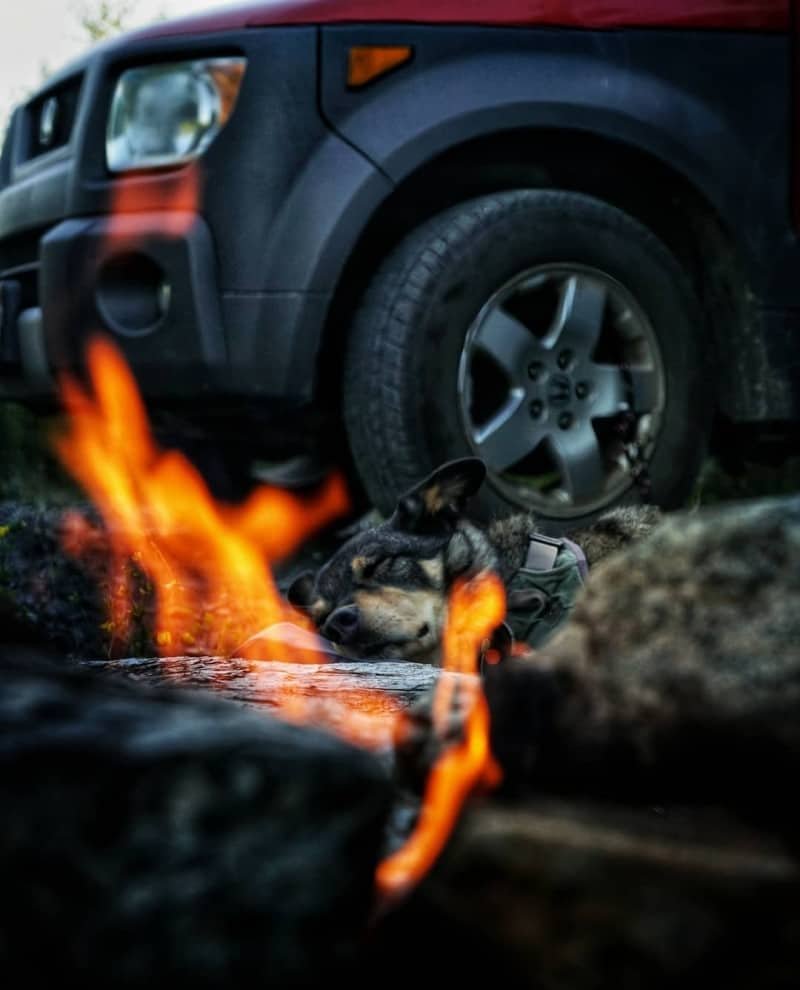
Happy car camping with your pets!
For free car camping options with your pets you can find Crown Land in Canada and BLM land in the USA. For camping with amenities such as a restroom and drinking water try provincial, state, and national parks. Staying at these parks often gives you access to amazing hiking trails, which the free camping options might not provide.
Where you camp will totally depend on your own preferences and style. Either way you’re bound to have a great and cozy adventure!
(Visited 1 times, 1 visits today)

